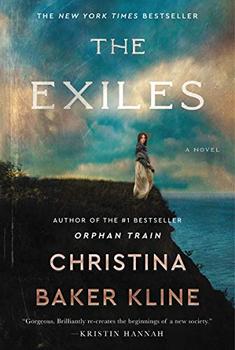Summary | Excerpt | Reading Guide | Discuss | Reviews | Beyond the Book | Readalikes | Genres & Themes | Author Bio

Prologue
Flinders Island, Australia, 1840
By the time the rains came, Mathinna had been hiding in the bush for nearly two days. She was eight years old, and the most important thing she'd ever learned was how to disappear. Since she was old enough to walk, she'd explored every nook and crevice of Wybalenna, the remote point on Flinders Island where her people had been exiled since before she was born. She'd run along the granite ridge that extended across the tops of the hills, dug tunnels in the sugary dunes on the beach, played seek-and-find among the scrub and shrubs. She knew all the animals: the possums and wallabies and kangaroos, the pademelons that lived in the forest and only came out at night, the seals that lolled on rocks and rolled into the surf to cool off.
Three days earlier, Governor John Franklin and his wife, Lady Jane, had arrived at Wybalenna by boat, more than 250 miles from their residence on the island of Lutruwita—or Van Diemen's Land, as the white people called it. Mathinna stood with the other children on the ridge as the governor and his wife made their way up from the beach, accompanied by half a dozen servants. Lady Franklin had a hard time walking in her shiny satin shoes; she kept slipping on the stones. She clung to her husband's arm as she wobbled toward them, the expression on her face as sour as if she'd bitten an artichoke thistle. The wrinkles on her neck reminded Mathinna of the exposed pink flesh of a wattlebird.
The night before, the Palawa elders had sat around the campfire, discussing the impending visit. The Christian missionaries had been preparing for days. The children had been instructed to learn a dance. Mathinna sat in the darkness on the edge of the circle, as she often did, listening to the elders talk as they plucked feathers from muttonbirds and roasted mussels in the glowing embers. The Franklins, it was widely agreed, were impulsive, foolish people; stories abounded of their strange and eccentric schemes. Lady Franklin was deathly afraid of snakes. She'd once devised a plan to pay a shilling for every dead snake turned in, which naturally spawned a robust market of breeders and cost her and Sir John a small fortune. When the two of them had visited Flinders the previous year, it was to collect Aboriginal skulls for their collection—skulls that were obtained by decapitating corpses and boiling the heads to remove the flesh.
The horse-faced Englishman in charge of the settlement on Flinders, George Robinson, lived with his wife in a brick house in a semicircle of eight brick houses that included rooms for his men, a sanatorium, and a dispensary. Behind this were twenty cottages for the Palawa. The night the Franklins arrived, they slept in the Robinsons' house. Early the next morning, they inspected the settlement while their servants distributed beads and marbles and handkerchiefs. After the noontime meal, the natives were summoned. The Franklins sat in two mahogany chairs in the sandy clearing in front of the brick houses, and for the next hour or so the few healthy Palawa males were made to perform a mock battle and engage in a spear-throwing contest. Then the children were paraded out.
As Mathinna danced in a circle with the others on the white sand, Lady Franklin kept looking at her with a curious smile.
The daughter of the chief of the Lowreenne tribe, Mathinna had long been accustomed to special attention. Several years ago, her father, Towterer—like so many of the Palawa deported to Flinders—had died of tuberculosis. Mathinna was proud to be the chieftain's daughter, but in truth she hadn't known him well. When she was three, she'd been sent from her parents' cottage to live in a brick house with the white schoolteacher, who made her wear bonnets and dresses with buttons and taught her to read and write in English and hold a knife and spoon. Even so, she spent as many hours a day as she could with her mother, Wanganip, and other members of the tribe, most of whom did not speak English or adhere to British customs.
Excerpted from The Exiles by Christina Baker Kline. Copyright © 2020 by Christina Baker Kline. Excerpted by permission of Custom House. All rights reserved. No part of this excerpt may be reproduced or reprinted without permission in writing from the publisher.
Your guide toexceptional books
BookBrowse seeks out and recommends the best in contemporary fiction and nonfiction—books that not only engage and entertain but also deepen our understanding of ourselves and the world around us.